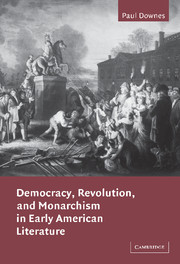Book contents
- Frontmatter
- Contents
- Preface
- Acknowledgments
- Introduction: the spell of democracy
- 1 Monarchophobia: reading the mock executions of 1776
- 2 Crèvecoeur's revolutionary loyalism
- 3 Citizen subjects: the memoirs of Stephen Burroughs and Benjamin Franklin
- 4 An epistemology of the ballot box: Brockden Brown's secrets
- 5 Luxury, effeminacy, corruption: Irving and the gender of democracy
- Afterword: the revolution's last word
- Notes
- Bibliography
- Index
2 - Crèvecoeur's revolutionary loyalism
Published online by Cambridge University Press: 22 September 2009
- Frontmatter
- Contents
- Preface
- Acknowledgments
- Introduction: the spell of democracy
- 1 Monarchophobia: reading the mock executions of 1776
- 2 Crèvecoeur's revolutionary loyalism
- 3 Citizen subjects: the memoirs of Stephen Burroughs and Benjamin Franklin
- 4 An epistemology of the ballot box: Brockden Brown's secrets
- 5 Luxury, effeminacy, corruption: Irving and the gender of democracy
- Afterword: the revolution's last word
- Notes
- Bibliography
- Index
Summary
I resemble, methinks, one of the stones of a ruined arch, still retaining that pristine form which anciently fitted the place I occupied, but the center is tumbled down.
(J. Hector St. John de Crèvecoeur, Letters From an American Farmer, 211)In “The Force of Law,” an essay on Walter Benjamin's study of political violence, Jacques Derrida writes of the “deconstruction of [a] network of concepts in their given or dominant state” in this way:
In the moment that an axiom's credibility (crédit) is suspended by deconstruction, in this structurally necessary moment, one can always believe that there is no more room for justice, neither for justice itself nor for theoretical interest directed toward the problems of justice. This moment of suspense, this period of époché, without which, in fact, deconstruction is not possible, is always full of anxiety, but who pretends to be just by economizing on anxiety? And this anxiety-ridden moment of suspense – which is also the interval or space in which transformations, indeed juridico-political revolutions take place – cannot be motivated, cannot find its movement and its impulse (an impulse which itself cannot be suspended) except in the demand for an increase in or supplement to justice, and so in the experience of an inadequation or an incalculable disproportion.
(“Force of Law,” 955, 957)- Type
- Chapter
- Information
- Publisher: Cambridge University PressPrint publication year: 2002

